
Cancer of the prostate is the second most common cancerous tumor worldwide and is the fifth leading cause of cancer-related mortality among men. The prostate is a gland in the male reproductive system that surrounds the urethra just below the bladder. Most prostate cancers are slow growing. Cancerous cells may spread to other areas of the body, particularly the bones and lymph nodes. It may initially cause no symptoms. In later stages, symptoms include pain or difficulty urinating, blood in the urine, or pain in the pelvis or back. Benign prostatic hyperplasia may produce similar symptoms. Other late symptoms include fatigue, due to low levels of red blood cells.

Prostate-specific antigen (PSA), also known as gamma-seminoprotein or kallikrein-3 (KLK3), P-30 antigen, is a glycoprotein enzyme encoded in humans by the KLK3 gene. PSA is a member of the kallikrein-related peptidase family and is secreted by the epithelial cells of the prostate gland.

The Palestine Children's Relief Fund (PCRF) is a registered 501(c)(3) non-governmental organization established in 1991, by, according to its website, "concerned people in the U.S. to address the medical and humanitarian crisis facing Palestinian youths in the Middle East." The main objective of the PCRF is to locate in the United States and Europe free medical care for children who cannot be adequately treated in the Middle East. Since 1991, tens of thousands of young people have received medical treatment through the PCRF.
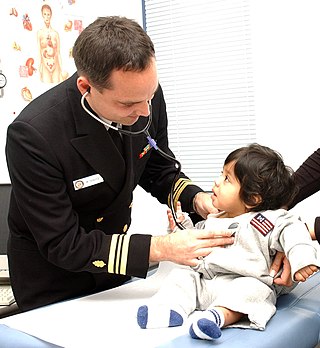
A nurse practitioner (NP) is an advanced practice registered nurse and a type of mid-level practitioner. NPs are trained to assess patient needs, order and interpret diagnostic and laboratory tests, diagnose disease, formulate and prescribe medications and treatment plans. NP training covers basic disease prevention, coordination of care, and health promotion, but does not provide the depth of expertise needed to recognize more complex conditions.

Movember is an annual event involving the growing of moustaches during the month of November to raise awareness of men's health issues, such as prostate cancer, testicular cancer, and men's suicide. It is a portmanteau of the Australian-English diminutive word for moustache, "mo", and "November". The Movember Foundation runs the Movember charity event, housed at Movember.com. The goal of Movember is to "change the face of men's health."
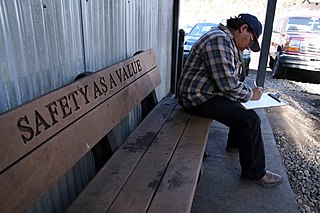
Screening, in medicine, is a strategy used to look for as-yet-unrecognised conditions or risk markers. This testing can be applied to individuals or to a whole population. The people tested may not exhibit any signs or symptoms of a disease, or they might exhibit only one or two symptoms, which by themselves do not indicate a definitive diagnosis.
Prostate cancer screening is the screening process used to detect undiagnosed prostate cancer in men without signs or symptoms. When abnormal prostate tissue or cancer is found early, it may be easier to treat and cure, but it is unclear if early detection reduces mortality rates.
International Men's Health Week (IMHW) is an international week celebrated in several countries the week preceding and including Father's Day to focus on issues facing men's health. International Men's Health Week began at an international level in 2002 when representatives from six men's health organizations around the world met in a meeting organized by Men's Health Network at the 2nd World Congress on Men's Health in Vienna, Austria, and resolved to work together to launch IMHW. This meeting followed preliminary discussions in 2001, at the first World Congress on Men's Health, about the need to coordinate awareness periods around the globe.
Patient advocacy is a process in health care concerned with advocacy for patients, survivors, and caregivers. The patient advocate may be an individual or an organization, concerned with healthcare standards or with one specific group of disorders. The terms patient advocate and patient advocacy can refer both to individual advocates providing services that organizations also provide, and to organizations whose functions extend to individual patients. Some patient advocates are independent and some work for the organizations that are directly responsible for the patient's care.
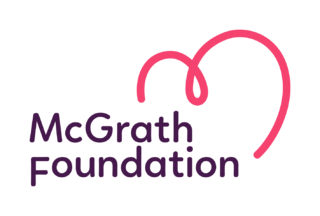
The McGrath Foundation is a breast cancer support and education charity in Australia, which raises money to place McGrath Breast Care Nurses in communities across Australia and increase breast health awareness. The charity was founded by Australian cricket player Glenn McGrath and his English-born wife, Jane McGrath, in 2005, following Jane's initial diagnosis and recovery from breast cancer. Jane died on 22 June 2008 at the age of 42.

The Prostate Cancer Foundation (PCF), headquartered in Santa Monica, California, funds research into the prevention and cure of prostate cancer.
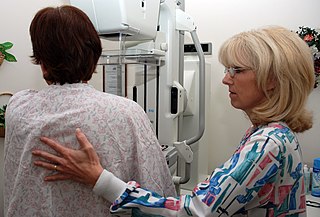
Cancer screening aims to detect cancer before symptoms appear. This may involve blood tests, urine tests, DNA tests, other tests, or medical imaging. The benefits of screening in terms of cancer prevention, early detection and subsequent treatment must be weighed against any harms.
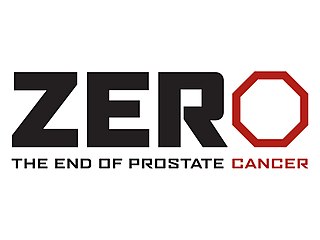
ZERO - The End of Prostate Cancer is a 501(c)(3) non-profit organization dedicated to prostate cancer education, testing, patient support, research and advocacy.
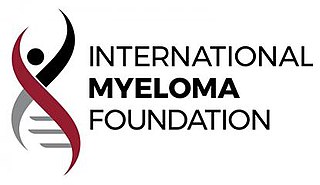
The International Myeloma Foundation (IMF) is an American non-profit organization serving patients with myeloma, a cancer of plasma cells in the bone marrow. The IMF also provides support and information for family members, caregivers of myeloma patients, physicians and nurses. The organization is dedicated to improving the quality of life for all myeloma patients by focusing on four key areas: research, education, support, and advocacy.

Active surveillance is a management option for localized prostate cancer that can be offered to appropriate patients who would also be candidates for aggressive local therapies, with the intent to intervene if the disease progresses. Active surveillance should not be confused with watchful waiting, another observational strategy for men that would not be candidates for curative therapy because of a limited life expectancy. Active surveillance offers men with a prostate cancer that is thought to have a low risk of causing harm in the absence of treatment, a chance to delay or avoid aggressive treatment and its associated side effects.While prostate cancer is the most common non cutaneous cancer and second leading cause of cancer-related death in American men, it is conservatively estimated that approximately 100,000 men per year in the United States who would be eligible for conservative treatment through active surveillance, undergo unnecessary treatments. The management of localized prostate cancer is controversial and men with localized disease diagnosed today often undergo treatments with significant side effects that will not improve overall health outcomes. The 2011 NIH State-of-the-Science Conference Statement on the "Role of active surveillance in the management of men with localized prostate cancer" pointed out the many unanswered questions about observational strategies for prostate cancer that require further research and clarification. These included:
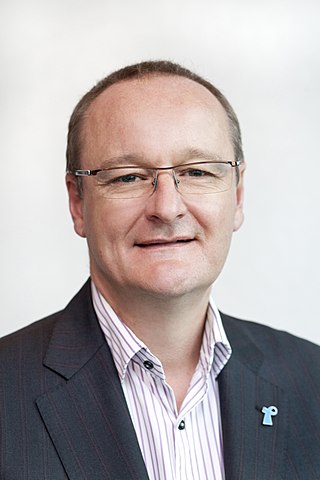
Anthony Peter Lowe AP is a British-Australian mathematical physicist and actuary. He previously served as chief executive officer of the Prostate Cancer Foundation of Australia, and is a frequent media commentator on prostate cancer and prostate specific antigen (PSA) testing.
The Distinguished Gentleman's Ride is a global motorcycle event raising funds and awareness for prostate cancer research and men's mental health programs on behalf of the Movember Foundation.
Founded in 1965, the foundation's key role is to support the leading medical and health research conducted at The Queen Elizabeth Hospital and the Basil Hetzel Institute for Translational Health Research to improve the health of the South Australian community.
Project Pink Blue, registered as Health & Psychological Trust Centre is a cancer nonprofit engaged in raising cancer awareness, patient navigation, advocacy and free breast and cervical cancer screening for women living in poverty. The organization launched Nigeria's first patient navigation in 2015 and a toll- free telephone centre 08000CANCER in 2016 Project PINK BLUE won the SPARC Metastatic Breast Cancer challenge grant by Union for International Cancer Control and Pfizer Oncology in Lisbon, Portugal.
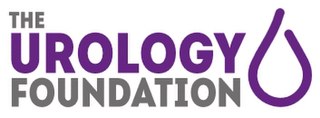
The Urology Foundation (TUF) is a charity that works across the UK and Ireland with the aim of improving the knowledge and skills of surgeons who operate on diseases of the male and female urinary-tract system and the male reproductive organs and funds research to improve outcomes of all urological conditions and urological cancers.














